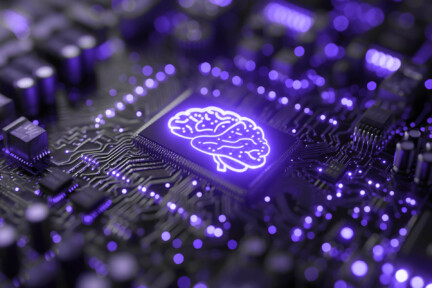

Artificial General Intelligence Meaning
What is AGI (Artificial General Intelligence)?
Artificial General Intelligence (AGI), or “strong AI,” is an advanced form of artificial intelligence designed to understand, learn, and apply knowledge across a wide range of tasks, much like human intelligence. AI researchers have varied perspectives on AGI and the future of AI development, with some focusing on achieving AGI and others working on more narrowly defined AI tasks.
The importance of background knowledge in AGI is crucial, as it enables AGI to think abstractly and reason effectively by drawing from a vast and nuanced understanding of various subjects. Unlike narrow AI, which excels in specific tasks – such as chess, facial recognition, or weather prediction – AGI could think, reason, and make decisions across various fields and contexts without requiring tailored programming for each one. This flexibility would enable AGI to transfer knowledge from one area to another and solve new, complex problems on its own, making it a truly adaptable, general-purpose intelligence.
In simple terms, AGI refers to a kind of AI that can perform any intellectual task that a human can do. Think of it as an AI that’s as versatile and adaptable as the human mind, capable of handling a wide range of challenges without pre-set rules or limitations, aiming to perform tasks at a level comparable to that of a human being. For example, an AGI system could learn a new language, perform medical research, or even write poetry without being specially designed for those tasks.
What is General Artificial Intelligence compared to current AI?
Current AI systems are generally classified as narrow AI or weak AI because they excel only in specific areas. For example, language models like ChatGPT can generate text, and image recognition systems can identify objects in photos, but neither system can seamlessly switch from task to task as humans do. AGI, on the other hand, would be able to apply its intelligence broadly, adapting to new tasks and learning from minimal data – an ability humans naturally possess but is extremely challenging to achieve in machines.
AGI (Artificial General Intelligence) challenge
Creating AGI is one of the most significant, ambitious goals in AI research, and the field of computer science plays a crucial role in defining and exploring AGI. It presents a series of complex challenges:
- Learning and Adaptability: AGI would need to continuously learn and adapt to new experiences and information, as humans do.
- Reasoning and Understanding: Developing a machine capable of true reasoning, common-sense knowledge, and nuanced understanding remains an unsolved problem.
- Consciousness and Self-Awareness: Some argue that achieving AGI might involve creating machines with self-awareness, or at least an understanding of complex social and emotional dynamics.
General Artificial Intelligence use cases
If achieved, AGI could revolutionize nearly every field by mimicking or exceeding human capabilities, including medicine, scientific research, engineering, and education. It could autonomously conduct research, make ethical decisions, solve global challenges, and even design new technologies or discover treatments for diseases.
AGI has the potential to be either highly beneficial or risky for humanity. While it could drive massive scientific breakthroughs and transform industries, it could also raise ethical and safety concerns, as an AGI with near-human or superhuman intelligence could operate autonomously without the need for human intervention, leading to unpredictable impacts. This is why responsible research and safety protocols are critical as AI scientists continue exploring AGI’s potential.
Computer scientists vary widely in their predictions for AGI’s arrival, playing crucial roles in defining and exploring AGI. Some, like OpenAI, anticipate gradual advancements and believe that AGI could come within the next few decades. OpenAI envisions AGI systems as beneficial to humanity, but acknowledges that responsible, controlled development will be essential to prevent risks.
On the other hand, other researchers, including some from Brookings and McKinsey, stress that AGI may be decades – or even centuries – away, citing the challenges in achieving a true, adaptable intelligence comparable to human cognition.
Current advances driving AGI forward
- Algorithmic Innovations: The shift from narrow AI toward AGI is being accelerated by improvements in algorithms, especially in generative AI models and deep learning frameworks that can mimic human-like reasoning across broader domains. Machine learning plays a crucial role in this development, providing the foundational technology that drives advancements towards AGI. New approaches, such as embodied cognition, aim to develop machines that learn from physical interaction with the environment, much like a human child learns.
- Computing Power: Recent advancements in graphics processing units (GPUs) and the potential for quantum computing are seen as pivotal to reaching AGI. GPUs have been instrumental in developing neural networks, and experts believe that further breakthroughs in computing infrastructure, possibly with quantum computing, could enable the complex processing required for AGI.
- Data Expansion: The proliferation of data—especially through technologies like 5G—offers AGI systems the vast, nuanced data needed to simulate and analyze human behavior in diverse contexts. This data influx will be essential for training AGI models on real-world complexity.
Future directions of Artificial General Intelligence
If AGI is realized, experts suggest it could revolutionize fields such as:
- Healthcare: By independently analyzing and diagnosing complex medical cases, AGI could expedite treatment discovery and improve healthcare accessibility.
- Climate Science and Engineering: AGI could assist in solving global challenges like climate change by modeling scenarios, suggesting innovative solutions, and creating new sustainable technologies.
- Education and Personalized Learning: In education, AGI might facilitate tailored learning experiences by adapting to each student’s unique needs and learning style in real time, striving to replicate the adaptive intelligence of the human brain.
A common concern is that the ongoing pursuit of machine intelligence and AGI development will require robust ethical guidelines and possibly even international regulatory bodies. OpenAI has called for global collaboration on questions of governance, benefit-sharing, and controlled development to prevent potential misuse or unintended consequences. Moreover, many researchers advocate for a gradual, cautious approach to AGI—prioritizing safety and alignment techniques to ensure AGI systems are beneficial and aligned with human values.
The path to AGI remains uncertain, and while advancements are promising, experts agree that safety, ethical considerations, and computational advancements are essential to realizing AGI responsibly. Achieving human level performance, where AGI can perform tasks and solve problems on par with human capabilities, is a significant goal. Bridging the gap between today’s narrow AI and true AGI could be one of humanity’s most transformative, yet challenging, achievements.
Ready to discover more terms?







